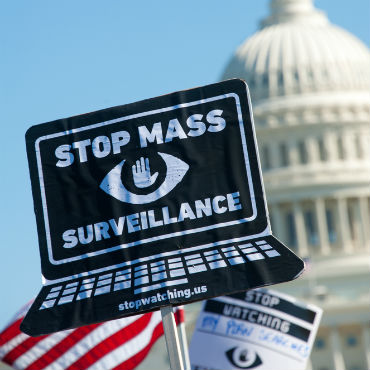Intell officials stand fast on surveillance
The bulk collection program was described as "low probability but high impact" by one witness, while an industry official warned of the economic consequences of a loss of trust in the U.S. tech sector.

In testimony before Congress, intelligence community leaders said the collection of communications data does not focus on domestic surveillance.
In a busy day on Capitol Hill for the intelligence community, top officials defended foreign and domestic spying activities and warned of the potential fallout from Edward Snowden's leaks.
During a Feb. 4 hearing called by the House Permanent Select Committee on Intelligence, leaders from the Office of the Director of National Intelligence, CIA, FBI and Defense Intelligence Agency answered lawmakers' questions about surveillance programs and reiterated the crucial role those programs play in national security.
They also uniformly agreed that Snowden's release of classified materials presents grave dangers to the U.S. and that the bulk collection of communications data is necessary to help prevent future terrorist attacks.
"We assume that everything Snowden touched he stole, so we assume the worst case in how we're reviewing all Department of Defense action, events [and] exercises around the world," said Lt. Gen. Michael Flynn, DIA's director. "I believe we will have to make adjustments in the future based on those assumptions."
Director of National Intelligence James Clapper downplayed the domestic spying aspects of Section 215 of the 2001 anti-terrorism law known as the Patriot Act, which authorizes the government to collect communications data.
Clapper said Section 215 is not a surveillance program and that with regard to the information Snowden stole, "less than 10 percent has to do with domestic surveillance. That's ballpark."
Nonetheless, committee members pressed Clapper to justify the collection of phone records metadata in the wake of revelations that National Security Agency Director Gen. Keith Alexander's original assessment that the information had helped the government foil 54 terrorism plots was exaggerated. In a previous hearing, Alexander recanted his assertion and acknowledged that the data had foiled far fewer plots, with only one case supporting NSA's assessment that retaining communications data is necessary.
But Clapper said there are other metrics that should be used to weigh the program's effectiveness, including the data's usefulness in speeding investigations.
FBI Director James Comey backed Clapper and said the metadata collected under Section 215 increases the agency's agility in the early stages of an investigation, thereby allowing investigators to do in minutes what used to take hours.
Clapper said the program was created after the 2001 terrorist attacks to address the country's inability to track communications. He defended the program against the charges that it has a low success rate in preventing or thwarting terrorist plots.
"It's a low-probability but high-impact [program], too," Clapper said.
In a concurrent House Judiciary Committee hearing examining possible changes to the Foreign Intelligence Surveillance Act, lawmakers questioned officials about surveillance capabilities and related issues, including transparency and a lack of trust in the government in the wake of Snowden's leaks.
"NSA is no longer a three-letter word, it's a four-letter word," said Rep. Doug Collins (R-Ga.). "How do we restore that trust?"
Dean Garfield, president and CEO of the Information Technology Industry Council, told the panel in prepared testimony that "the NSA disclosures, by creating a misimpression of the U.S technology sector, are eroding trust in U.S. companies and in the security of data they hold."
Garfield also warned that economic consequences accompany the loss of trust.
"The potential losses are tangible, demonstrable and widespread," he said. "In the short term, the resulting commercial losses will likely reach the tens of billions of dollars, translating into lost American jobs."
NEXT STORY: Senators Launch Probe of Massive Data Breaches





